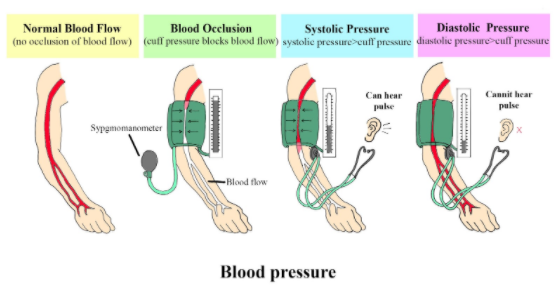Question
Question: What does it mean to have a blood pressure of 120/60?...
What does it mean to have a blood pressure of 120/60?
Solution
The heart is responsible for the supply of blood to various parts of our body. When the heart pumps its contracts and relaxes continuously resulting in the formation of pressure in the walls of the arteries and other blood vessels which in turn creates tension and helps in the blood flow.
Complete Solution:
As you know the heart is involved in the pumping of blood to all the parts of our body. The pressure that is exerted by the circulation of blood against the walls of the blood vessels is called Blood pressure. It is basically the pressure due to the pumping activity of the heart. It is measured by a device called the sphygmomanometer. This device consists of a mercury-filled tube that rises when the blood pressure increases. The blood pressure may be affected due to various factors which result in the fluctuation of the readings of the blood pressure.
Blood pressure is of two categories: systolic pressure and diastolic pressure. When the muscles of the heart contract and pump oxygenated blood to the various body parts via blood vessels then the blood pressure measured will be systolic pressure. When the muscles of the heart relax and expel the blood into the blood vessels then the blood pressure obtained will be diastolic pressure.
-The blood pressure is measured in mmHg which is a millimeter of mercury and is its unit of measurement. The reading of blood pressure will contain both the systolic and the diastolic pressure.
-The normal systolic pressure measurement will be 120 to 130 mmHg and the normal diastolic blood pressure measurement will be 80 to 88 mmHg, sometimes the reading may vary due to the various factors and certain conditions of the person.

Note:
Pulse is a measure of the heart rate which is ideally 72 beats per minute. But, blood pressure is the pressure exerted by blood on the blood vessels for which the ideal value is 120/80 mm Hg. High blood pressure can lead to the rupture of blood vessels and cause a brain hemorrhage. It may cause hypertension and heart failure.
